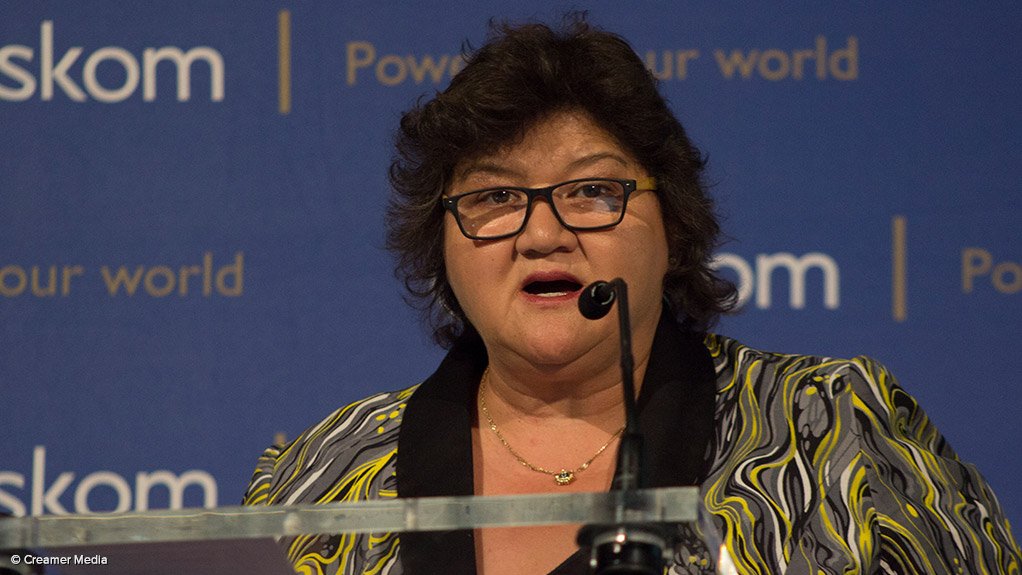Public Enterprises Minister Lynne Brown says a meeting, involving herself, the Ministers of Energy and Finance, as well as Eskom, should take place by mid-February to seek an “answer” to the current standoff over the signing, by Eskom, of 37 outstanding power purchase agreements (PPAs) with renewables independent power producers (IPPs).
In an address at Eskom’s quarterly ‘state of the system’ briefing in Johannesburg on Tuesday, Brown argued that the addition of more capacity at a time of excess capacity would result in additional costs to the company and increase electricity tariffs. “In my opinion, the Eskom board would fail in its duty if it did not consider the burden of high costs on consumers.”
However, she insisted in response to a question posed by Engineering News Online that she would not stand in the way of the signing of the contracts “if Eskom feels that they are ready”.
Nevertheless, she also argued that the procurement of the renewables capacity had proceeded on the basis of an Integrated Resource Plan that anticipated far higher levels of economic growth and electricity demand than had been achieved. “As a result, there has to be clear consideration of the rate at which new capacity is added to the grid else we risk having excess capacity.”
Eskom interim CEO Matshela Koko reinforced this position, arguing that the utility would be able to meet any increase in demand until 2021, owing to an operational surplus that had been averaging “5 600 MW at peak this financial year”.
He attributed the emergence of the surplus to a combination of a higher energy availability factor (EAF) from its coal-fired fleet, as well as the introduction of new capacity from Medupi, Kusile and Ingula.
“Generation has turned around its performance from 70.3% EAF in December 2015 to 77.3% EAF in December 2016, resulting in an extra 3 103 MW available to the grid.”
Koko dubbed the surplus a “game changer” and indicated that Eskom was actively courting new energy-intensive customers, while also seeking to grow its sales into the Southern African region.
The introduction of additional renewables IPP capacity, he asserted, would place a burden on the consumer and any additional capacity should, therefore, be added only at a pace and scale that was affordable. The utility has argued previously that the net cost of buying electricity from the operational wind and solar photovoltaic plants in 2016 was R9-billion and that the cost could approach R100-billion by 2021.
Eskom has been refusing to sign new PPAs since the middle of last year, despite a sharp fall in the solar and wind tariffs bid during the fourth bid window and subsequent expedited round of the Renewable Energy Independent Power Producer Procurement Programme.
The IPPs have, to date, refrained from taking legal action on the issue, having indicated that their preference was for a non-legal resolution to the impasse.
However, South African Renewable Energy Council (Sarec) chairperson Brenda Martin told Engineering News Online that patience was wearing thin and that she could no longer tell whether the unified stance of avoiding the courts would be sustained for much longer. This, notwithstanding Brown’s indication of a mid-February meeting of the responsible Ministers.
The urgency was rising as many IPPs would need to make a decision during the first quarter on whether or not they could feasibly retain staff, which had been employed in anticipation of plant construction and operation.
Martin acknowledged that the IPPs were associated with higher costs in the short term. However, she argued that the value of moving ahead with the roll-out of renewables lay in aligning South Africa’s future electricity mix with technologies whose costs were falling rather than rising.
“For us, the trajectory of tariffs is the simplest place to find the answer. The renewables-tariff trajectory is downwards, while the nuclear-tariff trajectory is upward. What we decide this year can either end up achieving a long-term outcome of lower tariffs, or higher tariffs, depending on the position taken.”
Edited by: Creamer Media Reporter
EMAIL THIS ARTICLE SAVE THIS ARTICLE
ARTICLE ENQUIRY
To subscribe email subscriptions@creamermedia.co.za or click here
To advertise email advertising@creamermedia.co.za or click here













